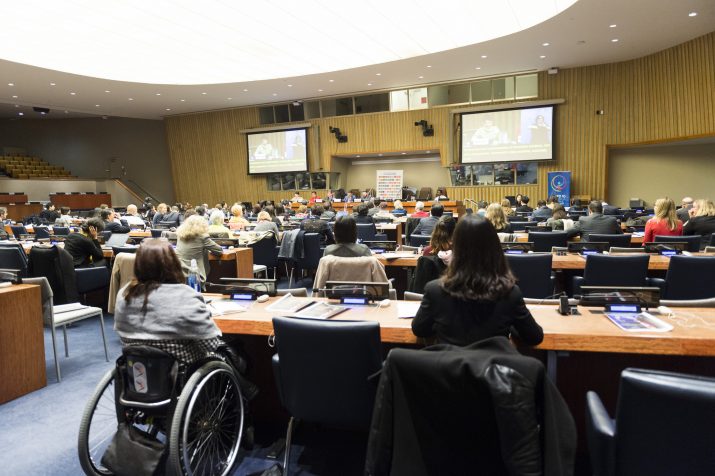
Convention
- Ratifications/Accessions: 182
- Signatories*: 164
Optional Protocol
- Ratifications/Accessions: 96
- Signatories*: 94
(* Signatories include countries or regional integration organizations that have signed the Convention and its Optional Protocol)
- 10th Anniversary of the adoption of CRPD: 2006 to 2016
- Infographic on the CRPD and the COSP (prepared October 2016: (Word, PDF)
- Status of Ratifications to the CRPD (prepared May 2016) (JPG, PDF) (also available at the UN Enable Facebook page)
- Support UNiversal ratification of the CRPD
- Full text of the Convention
- The Convention in Brief
- Conference of States parties
- Committee on the Rights of Persons with Disabilities
- Ratifications and Signatures of the CRPD and Optional Protocol
- Civil Society
- Frequently Asked Questions on the Convention
- Negotiation Archives
- Status of Ratification Interactive Dashboard (OHCHR Human Rights Indicators Work)
The Convention on the Rights of Persons with Disabilities and its Optional Protocol (A/RES/61/106) was adopted on 13 December 2006 at the United Nations Headquarters in New York, and was opened for signature on 30 March 2007. There were 82 signatories to the Convention, 44 signatories to the Optional Protocol, and 1 ratification of the Convention. This is the highest number of signatories in history to a UN Convention on its opening day. It is the first comprehensive human rights treaty of the 21st century and is the first human rights convention to be open for signature by regional integration organizations. The Convention entered into force on 3 May 2008.
The Convention follows decades of work by the United Nations to change attitudes and approaches to persons with disabilities. It takes to a new height the movement from viewing persons with disabilities as “objects” of charity, medical treatment and social protection towards viewing persons with disabilities as “subjects” with rights, who are capable of claiming those rights and making decisions for their lives based on their free and informed consent as well as being active members of society.
The Convention is intended as a human rights instrument with an explicit, social development dimension. It adopts a broad categorization of persons with disabilities and reaffirms that all persons with all types of disabilities must enjoy all human rights and fundamental freedoms. It clarifies and qualifies how all categories of rights apply to persons with disabilities and identifies areas where adaptations have to be made for persons with disabilities to effectively exercise their rights and areas where their rights have been violated, and where protection of rights must be reinforced.
The Convention was negotiated during eight sessions of an Ad Hoc Committee of the General Assembly from 2002 to 2006, making it the fastest negotiated human rights treaty.
Full text of the Convention on the Rights of Persons with Disabilities:
- Convention: English [HTML] – Optional Protocol: English [HTML]
- Convention and Optional Protocol: English [Print PDF] [Accessible PDF] [Word]
- Convention and Optional Protocol: Français [Print PDF] [Word]
- Convention and Optional Protocol: Español [Print PDF] [Word]
- Convention and Optional Protocol: عربي [Print PDF] [Word]
- Convention and Optional Protocol: Русский [Print PDF] [Word]
- Convention and Optional Protocol:汉语 [Print PDF] [Word]
Other translations *
- ALBANIA – Albanian [PDF]
- ARUBA – Papiamento [PDF]
- BRAZIL – Convention Portuguese [MS Word] and Optional Protocol Portuguese [MS Word]
- BANGLADESH – Bangla [PDF]
- CAMBODIA – Khmer [MS Word]
- CATALONIA – Catalan [PDF]
- CROATIA – Croatian [MS Word]
- GREECE – Greek [MS Word] UNRIC Website]
- HUNGARY – Hungarian [MS Word]
- IRAN – Persian (Farsi) [MS Word]
- ISRAEL – Hebrew [html, PDF]
- JAPAN – Japanese [html; PDF]
- KENYA- Kiswahili [MS Word]
- MALTA- Maltese [PDF]
- NETHERLANDS – Dutch [MS Word]
- POLAND – Polish [PDF]
- PORTUGAL – Portuguese [PDF]
- REPUBLIC OF KOREA – Korean [MS Word]
- ROMANIA – Romanian [html]
- SLOVENIA – Slovenian [MS Word]
- SWEDEN – Swedish [PDF]
- TURKEY – Turkish [MS Word]
Sign Language*
- Accessible PDF
- World Federation of the Deaf: International Sign Language videos
- World Federation of the Deaf: National Sign Languages
- New Zealand Office for Disability Issues: Sign language videos
- Canadian Association of the Deaf: American Sign Language
- Australian Department of Social Services: Australian Sign Language videos
- Institute of Educational Policy Greece: CRPD in in all accessible formats
- Serbian Sign Language version (Summary)
Easy read versions*
- It’s about Ability! An explanation of the Convention on the Rights of Persons with Disabilities (UNICEF)
- Easy-read version of the CRPD – Dutch
- Easy-read version of the CRPD – English
- Easy-read version of the CRPD – Finnish
- Easy-Read version of the CRPD – Hungarian
- Easy-read version of the CRPD – Portuguese
- A human rights handbook for people with developmental disabilities
- We are ABLE! (Singapore)
- Institute of Educational Policy Greece: CRPD in in all accessible formats
Other related publications
CRPD Training Guide – PDF (OHCHR, 2014)
- CRPD Training Guide – PDF (OHCHR, 2014)
- Handbook for Parliamentarians on the Convention on the Rights of Persons with Disabilities
- The Convention on the Rights of Persons with Disabilities: A Training Guide (Website) (PDF). Professional Training Series No. 19 (OHCHR, 2014)
- Monitoring the Convention on the Rights of Persons with Disabilities: Guidance for human rights monitors. Professional Training Series No. 17 (OHCHR, 2010)
* These non-official versions of the Convention are provided by other sources and are for informational purposes only; they do not constitute endorsement of, or an approval by, the United Nations of any of the text or products, services, or opinions of the organization or individual. The United Nations bears no responsibility for the accuracy, legality or content of their statements and opinions.
 Welcome to the United Nations
Welcome to the United Nations